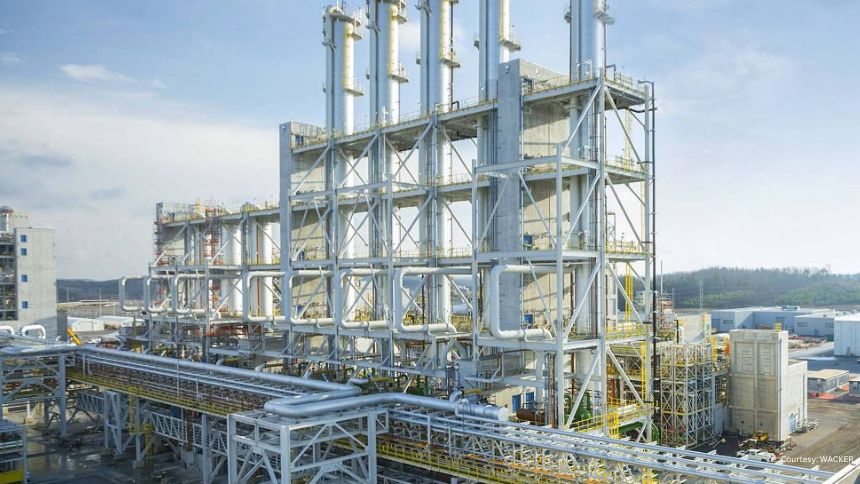
WACKER working to make its chemical plants safest in the country
Working in a chemical plant is not easy, but it should be safe. That safety is what's driving the team at WACKER's Charleston, Tenn. plant.
When you approach the WACKER chemical plant in Charleston, Tenn., the first thing you see is a large white sign that reads, in all capital letters, “SAFETY.”
“SAFETY is a core value and pre-condition for all we do,” the sign reads in its entirety.
“Our goal is to run efficiently and successfully at Charleston…and to be known as the safest, most environmentally sound industrial chemical company in the U.S.,” said Derek Kozlowski, Senior Engineering Manager of Asset Reliability Excellence for WACKER.
It’s a job Kozlowski takes seriously. He started at the German-based WACKER plant in Charleston about a month before tragedy struck in the fall of 2020.
“We had an incident that resulted in two fatalities,” said Kozlowski. “And out of that, it was recognized that we needed to do something differently. We didn’t have a maintenance problem. We had an operating problem.”
Part of that problem was a lack of communication between the many devices needed to produce polysilicon, the plant’s product. Different operating systems weren’t connected “so you need something that ties all that software together,” Kozlowski explained.
“We weren’t operating in a way that ensured things were done safely,” he said. “We started predicting failures rather than fixing failures.”
Not anymore. Kozlowski and his team are implementing an asset performance management system at all North American plants, which he explains is a way to look at all those competing systems at once and determine when something will wear out and when to fix it before it fails. “What we’re looking at is how can we operate in the safest, most environmentally sound, and productive way that we can, in that order,” he said.
Kozlowski is a team-forward leader at WACKER, and knows safety is a priority not just for him, but the people that work on the ground in the chemical plant.
“If you’re not paying attention to your people, you can’t run. So if you want to be able to run and be a profitable company, you’ve got to run safely,” he said. “You’ve got to have people show up to work and you’ve got to remember your associates come first always. First and foremost, you work for them.”
It’s that employee-first attitude and a renewed commitment to safety that make WACKER a desirable place to work, despite the drawbacks of working in an industrial plant.
“It’s a challenging environment,” said Kozlowski. “It’s mostly outside in the elements. Although our pay is very high, the work is hard, so offering more money isn’t necessarily going to get you there. You’ve got to listen to your employees. Give them a voice. Put them first. Recognize them when they do well. Suck it up when something happens and work through it. But if you put your employees first and listen to what they’re telling you, it always goes back to you can’t manage people, you lead them. If you want to lead them you’ve got to listen. And so that’s what WACKER is doing to keep employees.”
They’re working hard on recruitment and retention. WACKER opened the Charleston plant in Bradley County for many reasons, including the local labor force.
“It’s an extremely technologically complex product and we’re not in an extremely high-technology labor market here in Bradley County,” said Kozlowski. “That’s why we’re investing in the boot camp. That’s why we’re investing in the associates.”
WACKER’s new boot camp training program is for new recruits as well as current operators who want to move up into a supervisory position. If someone doesn’t have the skills WACKER needs, they’ll train them.
“It is actually training people and carrying them through chemistry, operations, safety, how we approach PPE,” said Kozlowski. “How do you work in the environment? And what do we actually produce, and how does what you do today affect the final product, and affect the plant? So it’s giving everyone an education on what we actually do, what you do specifically, and how that contributes to the outcome. And then the more we know about the job that we’re doing, the safer we will be.”
Kozlowski is proud of the work WACKER does, and proud of the people working there each day, and wants to keep them safe and happy.
“There aren’t a lot of chemical operators in this area that know polysilicon, it’s a very specialized field. So to bring people in and tell them, ‘we value you and you’re making the purest manmade substance on Earth and we’re the number one in the world at it,’ when you put it to them like that, it changes the perspective about what they do every day.”


